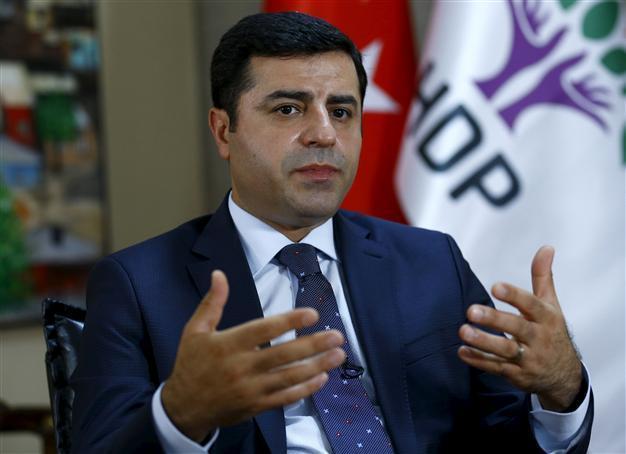Turkish military campaign aims to prevent Kurdish unity in Syria: HDP co-chair
ANKARA - Reuters

REUTERS photo
The main aim of Turkey's recent military operations in northern Syria and Iraq is to prevent Kurdish territorial unity and not to combat Islamic State of Iraq and the Levant (ISIL), the leader of Turkey's pro-Kurdish opposition HDP said on July 30.In an interview with Reuters, Selahattin Demirtaş accused President Tayyip Erdoğan and the ruling Justice and Development Party (AK Party) of dragging Turkey into conflict in revenge for the AKP losing its majority in a June 7 general election.
That election saw the HDP win enough votes to enter parliament as a party for the first time, ending more than a decade of single-party rule in the NATO member country.
"The AK Party is dragging the country into a period of conflict, seeking revenge for the loss of its majority in the June election," Demirtaş told Reuters in the capital Ankara.
"HDP passing the threshold and the AK Party losing its parliamentary majority are being used as a pretext for war."
Turkey launched near-simultaneous air strikes on the outlawed Kurdistan Workers Party (PKK) camps in northern Iraq and ISIL fighters in Syria last Friday, in what Prime Minister Ahmet Davutoğlu has called a "synchronised fight against terror".
But its assaults on the PKK have so far been much heavier than its strikes against ISIL, fuelling Kurdish suspicions that its real agenda is keeping Kurdish political and territorial ambitions in check, something the government denies.
"Turkey carried out a couple of air strikes against the Islamic State just for show, without causing serious damage to it, nor is Islamic State feeling serious pressure from Turkey," Demirtaş said.
"Turkey's operations do not aim at taking measures against Islamic State. The main objective is to prevent the formation of a Kurdish entity in northern Syria," he said.
Air strikes
Ankara is uncomfortable with the steady advance of Syrian Kurdish PYD forces, helped by U.S. air strikes, against ISIL. Around half of Syria's 900 km (560 mile) border with Turkey is now controlled by Kurds.
Erdoğan and the AKP worry that those advances will embolden Turkey's own 14 million Kurdish minority and rekindle a three-decade insurgency by the PKK, deemed a terrorist organisation by Turkey, the United States and Europe.
After Ankara agreed to open its air bases to the U.S.-led coalition last week following years of reluctance, Turkey and Washington are working on plans to provide air cover for Syrian rebels and sweep ISIL fighters from a strip of northern Syria along the Turkish border.
But the move will also ensure that territory remains out of the hands of the PYD, preventing Syria's Kurds from joining up areas under their control into what could otherwise become a strip of Kurdish land running from the Iraqi border almost to the Mediterranean.
"Erdoğan stressed in the past that they would never allow the unification of Kurdish cantons in northern Syria. Jarablus is the only obstacle for this unity," Demirtaş said, referring to a Syrian town on the edge of the proposed "safe zone".
Turkish officials have said the aim in Syria is to push ISIL away from the border and their operations will not target Syrian Kurdish groups.
They say the strikes against PKK camps in northern Iraq, meanwhile, are a response to increased militant violence in recent weeks, including a series of targeted killings of police officers and soldiers blamed on the Kurdish militant group.
At least nine members of the security forces have been killed over the past week by suspected Kurdish militants.
The PKK has said the air strikes are an attempt to "crush" the Kurdish political movement and create an "authoritarian, hegemonic system" in Turkey.
















